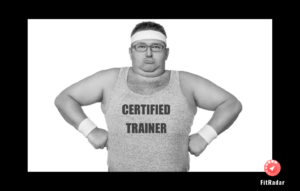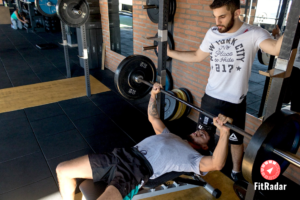1. Selling or Suggesting Supplements
Selling or suggesting the use of supplements is the biggest and most glaring issue I have with trainers and I know that I will probably get a bunch of angry personal trainers taking issues with this but I don’t care. If a trainer, live or on a video, suggests the use of or even worse tries to sell you supplements, walk away. First, when it comes to fitness and health gains, supplements are not necessary. Secondly, unless you have come across a trainer who is also a doctor they can not legally or ethically give supplement “prescriptions” or suggestions. The only reason supplements are promoted at all is because of money. Supplements are a multi-billion dollar business and most of the hype and “benefits” of supplementation come from the mouth of the people who make and sell them.
2. Body Shaming to Motivate
There are many ways to motivate a client to exercise but the most mentally detrimental way to motivate is by shaming someone into action. Body shaming especially breeds all kinds of disordered thinking, feelings of guilt, and inadequacy. If a trainer uses these type of tactics to motivate they are not looking out for your best interests for long term health. If a trainer belittles your physical appearance to try to get you to exercise or to adhere to a specific diet then drop them and look for a trainer that motivates you by making you think more positively and constructively about yourself, your body and your physical ability.
3. Only Promoting One Training Style
There are hundreds of exercise training styles out there from Olympic Weightlifting, Plyometrics, Agility, Mass Building, and Toning, to Cardiovascular, HIIT, Yoga, Pilates and Flexibility (just to name a few). All of these styles have pros and cons but there is no shortage of trainers that will argue to the death that their preferred style of training is better than all the rest. It is a narrow-minded and short-sighted trainer that thinks that everyone should train the same way or with only one training style. For overall health you need to exercise in different ways to challenge the different physical abilities of the human body, for strength, endurance, flexibility, coordination, balance, agility, etc, etc. Depending on your own personal goals you may want to lean slightly more towards one training style than another but never focus on just one. Any trainer that does not look at the whole picture is not one you want to train with.
4. Don’t Properly Develop Workouts
This is a bit harder to explain but very important when it comes to the effectiveness of a trainer. Not all programs are created equally and many trainers don’t check their programs for balance. Not the standing on one foot kind of balance but rather balancing the body front to back left to right, and top to bottom. For example, I was watching a workout video the other day by a well known and well-funded trainer and I was watching them do a squat in a circle where one foot stayed stationary and the other took steps forward to complete a circle. They did a couple of sets and the whole time I was waiting for them to switch directions and step backward but they never did and to top it off they never even switched legs. Another good example would be a workout video by a well known YouTube trainer who starts their warm-ups with deep pile squats to start with which is much too rough of a range of motion on cold muscles and joints, and just asking for an injury or pulled muscle, purely due to poor programming. These might seem like small things to nitpick but using a trainer that does not think about the balance of the body’s muscles can easily lead to muscle imbalances which can cause chronic issues or can increase your likelihood of injury.
5. Promote Weight Loss Before or Instead of Muscle Building
Trainers who only focus on weight loss and not muscle/strength building are doing clients a huge disservice. Those who only focus on sheer calorie burn through cardio, toning (lightweight training), or core exercises, as their only form of exercise, are working with a limit to how much they can burn and typically have to heavily restrict caloric intake to see progress. On the other hand, if you start with strength training to build a good base of muscle you can increase your resting metabolism as well as max calorie burn for any given exercise, therefore, burning more calories with the same relative level of effort. Your body’s Basal Metabolic Rate (BMR), the rate at which your body burns calories just keeping itself alive, is set not only by your body’s natural functions but also by the amount of muscle tissue you have. So, if you add more muscle tissue you add more calorie burn potential both during exercise and daily life activities. This increased BMR due to more muscle mass makes it easier to not only drop fat weight but to also keep it off in the long run. The best thing is that it does not take much muscle mass to make a huge difference in the number of calories you need in a day. So, especially for any ladies out there who are worried about getting too bulky or masculine from weight lifting remember that a little goes a long way. If you are trying to lose weight and your trainer only does lightweight training, cardio or core exercises it does not necessarily make them a bad trainer just one that will be less effective for helping you lose fat content (and keep it off).
6. Focus on Intensity Over Form
This issue is especially prevalent with the bodybuilder culture as well as some of the boot camp style trainers out there. Many of them will choose to focus on how much you lift or how hard you push yourself over all else. We have nothing against pushing yourself or wanting to lift heavy but what we can not agree with is letting form and proper technique slide just to lift a bit more weight or push for a few more reps or seconds. Proper form is by far the most important aspect to focus on during any type of training. If the form is not maintained then the returns from that exercise or movement start to diminish quickly. One thing I see a lot especially with weight lifters/bodybuilders is a limitation of range of motion so they only target the strongest portion of their range rather than moving to a lighter weight and moving through their entire range of motion for maximum muscle development. Not only can this create or intensify weak spots but it can also change posture and joint tracking which can cause long term issues with chronic pain, discomfort, and overall joint stability. If a trainer knows what they are doing they will always know when to lower intensity to favor better function and long term results. So, if you have a trainer that tries to push you past your comfort zone or does not teach proper form look for someone else.
7. Trainers that don’t Educate or Empower Clients
There are some professionals, found in any industry, who feel that you should give just enough information to keep a client coming back so they can fill up their schedules and make more money. I believe that, ethically speaking, this is a huge flaw if you’re actually trying to help someone. With our videos now and back when I was still doing one on one training and group fitness classes I would aim to teach clients everything they need to know to be a more active participant in their own health and fitness. I want each person to know why they are doing each exercise and why they are doing them in that specific order. It was my goal as a trainer to teach a client to the point that they did not need me anymore, which sounds stupid if you are trying to make money but if you have a trainer that really wants to change people’s lives and help long term then they won’t get caught up in the money. However, if you teach a person well, they will not only be empowered, they will also trust you and know that you have their best interest in mind, which may make them more likely to use your services anyways.
8. Believe In or Promote Spot Reduction
This has two sides to it, number one is just literally a trainer that believes that spot reduction is possible and tries to sell you on it. It is not possible, and a trainer that tries to tell you otherwise you need to avoid. The second part of this is a trainer that dispenses any false information either willingly or unknowingly (for example women should not lift weights, low-intensity exercise burns more fat, if you exercise you need more protein supplements, ab exercises burn belly fat, or cardio is the best way to lose weight). It comes down to the facts that they are either intentionally lying and will say anything they need to make a quick buck or they are not educated enough in their field to be a safe, or effective trainer. Either way if you hear a trainer saying something double-check it until you know they can be trusted, especially if it sounds too good to be true.
9. Promise Quick Results
Many people start into an exercise routine with the hope that it will be easy to hit their goals as long as they put in some effort for a while. I know that it can be discouraging to some to hear that they are not going to drop 10 pounds in a week without serious health repercussions and that they need to realise that exercise and health are things that need to be a permanent part of their life. Infact I have lost a number of potential clients because I have told them that their goals will take longer to reach than they want. A good trainer will make the hard decision to address false hopes and help people set new attainable ones. Whereas a bad trainer will keep their mouth shut just to get a paycheck or even worse plant that false hope just to close the deal. Improving physical ability takes time, weight loss takes time, gaining flexibility or balance takes time and anyone trying to tell you otherwise will never have your best interests in mind.
10. Talk about Lower Abs
This is a very specific one and really falls under dispersing false information but it is one that really bothers me. Any trainer that says they are going to show you an exercise to work on your lower abs does not know what they are talking about. There is no such thing as lower abs! I could go on and on forever about this but I am not going to in order to keep this short. If you want to know the specifics then let me know in the comment section and if enough people are interested then I will make another article and vlog about it. But for now lets just keep it at, if you hear a trainer talk about working the lower abs, they are a either completely clueless as to how the human body works or they are just trying to tell you what you want to hear.
I hope my list helps you find great trainers to help you and more importantly helps you avoid the bad ones. Afterall there is more at stake here than just your waistline. Finding the right well educated personal trainer can be the difference between becoming a happier, stronger, fitter, smarter individual or becoming a person who hates exercise, and feels that they will never succeed. There are many good trainers out there, and finding one that works for you can make a huge positive impact on your progress towards your goals and overall outlook on health and fitness.
Remember that this is just my opinion and if you think there is something else that should be on this list please include it in the comment section below as I would love to hear it. Also if you don’t agree with any of my top ten let me know which one and why.
P.S. Visit our website and join the mailing list! Our app is coming soon:
Source: https://bit.ly/1lNl5xl




